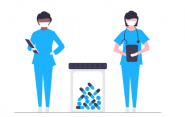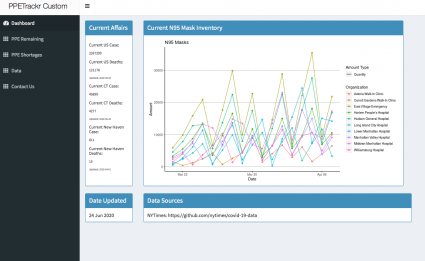Yale-Made Program Tracks City's Protective Equipment During Pandemic

When the COVID-19 pandemic hit, personal protective equipment (PPE) such as gloves, masks and respirators was in high demand. Keeping track of those supplies was a job in itself. With PPETrackr, a team of Yale students and faculty have made it a little easier.
 Nathaniel Raymond, a lecturer at the Jackson Institute for Global Affairs, said the program came out of the idea that effective management of PPE at the municipal and state levels can reduce mortality and morbidity - and that there were few user-friendly ways to do that.
Nathaniel Raymond, a lecturer at the Jackson Institute for Global Affairs, said the program came out of the idea that effective management of PPE at the municipal and state levels can reduce mortality and morbidity - and that there were few user-friendly ways to do that.
“We thought, how do we make this as seamless as possible for people who are literally having the worst day of their lives, every single day?” he said.
PPETrackr gives both governments and healthcare facilities tools to help them understand their inventory changes. Users can log their daily inventory of PPE and see their data in various forms on the app’s dashboard. It also allows government officials to oversee PPE inventory across healthcare facilities in their communities to help them make good decisions about acquiring and distributing PPE supplies.
Raymond enlisted the help of several students, including computer science students Rachel Sterneck ‘21 and Varsha Raghavan ‘20 who led the coding work to get the open-source program up and running. Tony Formica, a Jackson Institute for Global Affairs '20 student and active duty Army Major, and Devin Osborne ‘21, a Forestry & Environmental Studies student, also helped oversee the project.
The PPETrackr team set out to create a system in which data could easily be registered, whether it entailed the inventory of an entire hospital or a single squad car.
“Our main priority was ease of use for the app because we knew that would be a big obstacle for us getting it adopted,” said Sterneck, adding that they set a goal of “a few minutes or less.”
The team of Raghavan and Sterneck made a proof-of-concept, took on a team of additional coders to work with them, and then added more features until they were happy with the product. They then tested it out with the help of members of Yale Emergency Support-New Haven, a group that formed to help with the city’s COVID-19 response. Testers were encouraged to point out any bugs they encountered.
Raymond noted that they’ve talked to several governments about PPETrackr, including in Seattle and Iceland. The city of New Haven was the program’s first adopter. That includes emergency workers, police, and firefighters. But it also includes anyone who still had to work with the public - that could be city engineers, for instance, park officials or mortuary workers - who had very little experience using PPE.
“At one point, it was also utilized in one of the ad hoc homeless shelters for COVID-positive residents,” Osborne said, adding that the system averted a bad situation there by detecting a PPE shortfall.
It’s a lot to keep track of, and to the uninitiated, standard systems for doing so can be intimidatingly complicated.
“The folks at City Hall decided we needed to have something that allowed us to integrate our tracking of PPE throughout other city departments, which weren't used to tracking PPE,” said Lt. Justin McCarthy of the New Haven Fire Department. “And we got hooked up with the folks at PPETrackr.”
“It’s a huge help,” said McCarthy, who’s in charge of tracking the city’s PPE. “When you’re trying to manage something on this scale, it’s extremely difficult because it’s constantly changing. On top of that, you have requirements set forth by the federal government of what needs to be tracked and how.”
PPETrackr works on a layered system that allows individual users to see only the data from their own accounts. Municipal leaders, though, can see all of the accounts that they manage.
“That portion required us to figure out how to associate municipal accounts with individual hospital accounts,” Raghavan said. “That was one of the features that took a lot more thinking to flesh out. Another was how to authenticate people’s accounts to make sure that someone is who they say they are.”
While designing the program, they realized that certain details, such as supply reimbursement, were applicable to only some of the program’s potential users around the globe.
“So we made this an open-source project,” Sterneck said. “We provided this base app that is regionally agnostic and completely open-sourced it so other people can pick up from the work we created and adapt it.”
The need to track PPE in New Haven has calmed down since the outbreak’s peak, but PPETrackr’s makers say they’re prepared to distribute it in the case of a second wave. McCarthy said the city would also use it again - probably even more so, now that all of the logistics have been worked out. He added that he wouldn’t be surprised if it proves valuable beyond COVID-19.
“From difficult times come some very innovative and new ideas,” he said. “The PPETrackr folks saw a need, and I think a lot of people could see the value in it - not just for this, but for a variety of things.”

